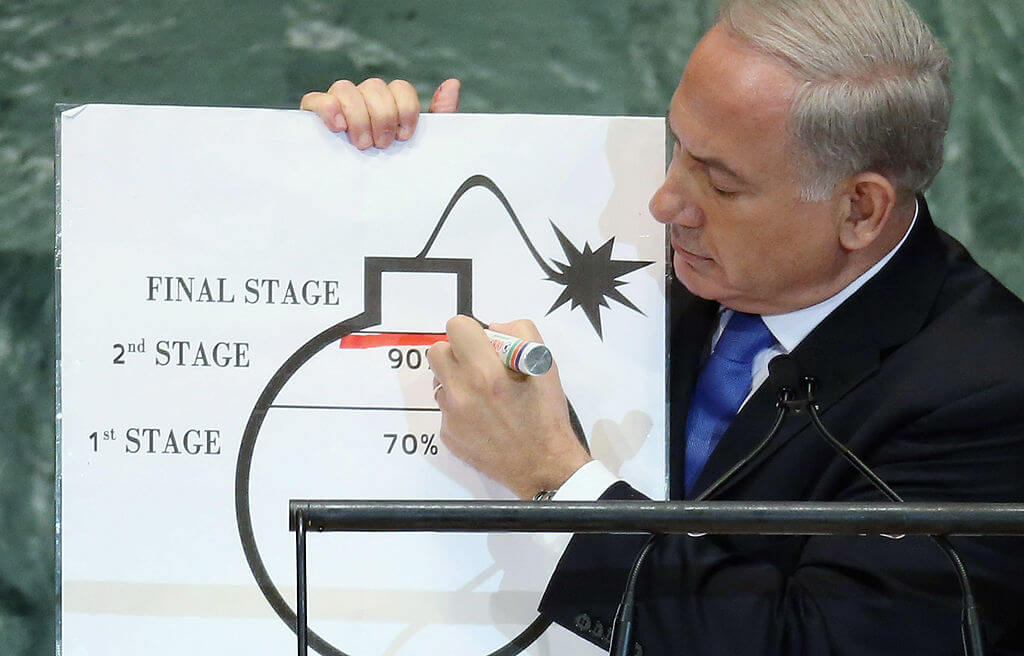Analysis: Netanyahu will address the United Nations. Here’s why it’s his favorite stage.
Netanyahu has delivered at least 12 speeches at the United Nations. Here’s what he wants to achieve with the next.

Israeli Prime Minister Benjamin Netanyahu at the United Nations General Assembly on Sept. 22, 2023. Photo by Jeenah Moon/Bloomberg via Getty Images
Facing an escalating military crisis at home, Israeli Prime Minister Benjamin Netanyahu could have asked to address the United Nations via video from Tel Aviv on Friday, much the same way Ukrainian President Volodymyr Zelenskyy did from Kyiv months after Russia’s invasion.
But as Israel’s war against Hamas expands into a potentially more costly war against Hezbollah in Lebanon, Netanyahu aims to make his case for the conflict as vividly as possible — and in person. He wants to stand in front of the General Assembly’s iconic green marble backdrop, and speak directly to a global and Israeli audience.
Other world leaders have come before the General Assembly this week to inveigh against Israel. On Friday, Netanyahu gets his rebuttal.
Here is how the he intends to use his time on the U.N. stage.
Netanyahu, UN regular

Netanyahu has addressed the United Nations General Assembly at least 12 times. Few Israelis have spent more time at its podium.
Delivered in fluent English, and thematically consistent, Netanyahu’s speeches remind the world that Israel faces a determined set of enemies: Iran is fast developing its nuclear capabilities and arming proxies, and Palestinians are trying to destabilize Israel in the West Bank and from Gaza. As in past years, Netanyahu will personally ask for the world’s support.
Only twice — in 2010 and 2019 — did he send his foreign minister to speak in his place, due to security concerns and political challenges at home. On both occasions, those addresses fell short of his expectations. In a time of crisis, Netanyahu sends his A-team, which he defines as himself.
Carried live on Israeli networks, Netanyahu’s U.N. speeches are crafted to project strength — the statesman defending Israel before the leaders of the world.
Netanyahu, propmaster

In recent years, Netanyahu has brought attention-grabbing props to the U.N. podium. As he intended, many sparked media buzz.
- In his 2009 address, Netanyahu displayed original 1942 Nazi-era documents, detailing the extermination of Jews, to rebut Iranian President Mahmoud Ahmadinejad’s denial of the Holocaust.
- Netanyahu in 2012 held up a cartoonish drawing of a bomb and drew a red line to illustrate the point at which, he said, world leaders had to stop Iran’s efforts to build a nuclear weapon.
- He brought a large photograph of Palestinian children playing near a Hamas rocket launcher in a civilian area of Gaza in his 2014 speech.
- In 2018, he presented aerial photographs that he said showed evidence of Iran’s secret nuclear activities.
- Last year Netanyahu held up a map titled “The New Middle East” to illustrate a vision for regional peace.
What might he bring this year? Perhaps a map showing Hezbollah missile sites in civilian areas, or a photograph of the Israeli hostages with their captors.
Highlighting the hostages

Several relatives of the 101 Israeli hostages still held by Hamas in Gaza are expected to attend the Friday morning speech. Some joined Netanyahu on his flight from Tel Aviv. He will likely talk about the hostages’ suffering, and those killed in captivity.
As ceasefire negotiations in Gaza remain stalled and the Israeli military’s focus shifts to striking Hezbollah in Lebanon, Netanyahu will also likely speak about Israelis forced to leave their homes in the north, the target of daily Hezbollah rocket attacks.
Expect him to make the case for continuing the war against Hamas in Gaza, and to blame Hamas for rejecting the hostage-ceasefire deal presented in May by American, Qatari and Egyptian mediators.
An unwelcoming committee

Netanyahu’s approval rating in Israel, which tanked this spring, has risen markedly in recent weeks, thanks in large part to Israeli assassinations of terror leaders in Beirut and Tehran. But Jewish Americans and Israeli ex-pats in the U.S. hold him in much lower esteem. Many of them have gathered outside the U.N. this week to protest Netanyahu for failing to secure a hostage-ceasefire deal that could have brought home some of the surviving hostages.
At a demonstration on Thursday, New York City Comptroller Brad Lander, who is Jewish, recalled his attendance last year at a protest against the Netanyahu government’s plan to overhaul Israel’s judiciary, a series of proposed changes many Israelis and American Jews rejected as anti-democratic.
“A year later, we are here again, this time to protest his abandonment of the Jewish tradition of ‘pidyon shvuyim‘ and his continuation of the war,” Lander said Thursday, using the Hebrew words for the Jewish imperative to free captives.















